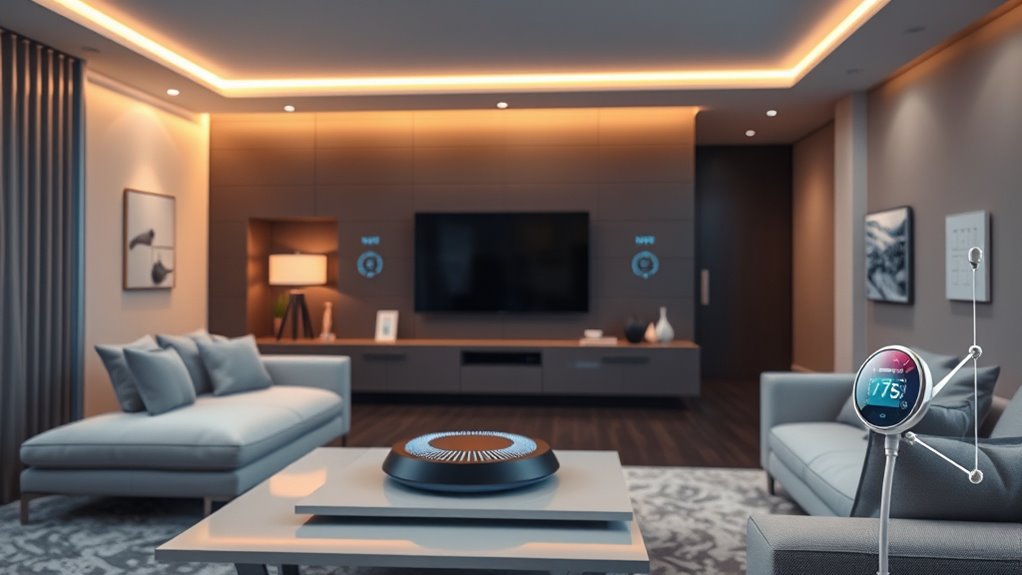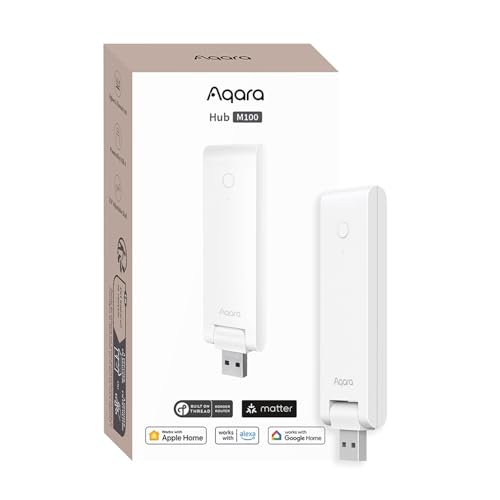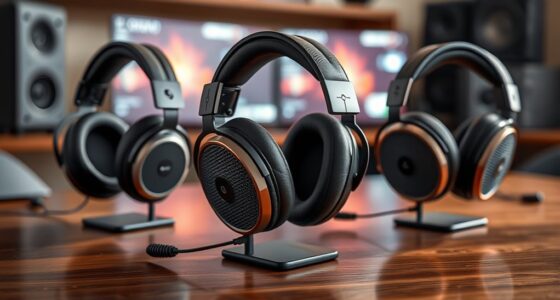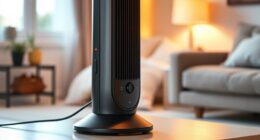If you’re looking to upgrade your smart home with reliable, fast, and interconnected devices, I recommend exploring Thread-enabled options like smart plugs, buttons, and hubs. Devices such as the TP-Link Tapo Matter Smart Plug, Linkind Smart Plug, and Eve Energy offer seamless control, energy efficiency, and broad ecosystem compatibility. Sensors and hubs from Aqara further enhance automation capabilities. Keep exploring to discover how these devices can truly transform your living space with connectivity and convenience.
Key Takeaways
- Many smart home devices now support Thread protocol for faster, more reliable local connectivity and seamless interoperability.
- Thread-enabled devices include smart plugs, sensors, switches, and lighting, enhancing automation and user control.
- Ecosystem compatibility varies; devices often support Apple HomeKit, Google Assistant, and SmartThings alongside Thread.
- Thread’s low-latency, mesh network improves device responsiveness and stability across the smart home network.
- Choosing Thread-enabled products ensures future-proofing with robust, secure, and scalable smart home integration.
TP-Link Tapo Matter Supported Smart Plug Mini (3-Pack)
If you’re looking for a reliable, easy-to-use smart plug that works seamlessly across multiple platforms, the TP-Link Tapo Matter Supported Smart Plug Mini (3-Pack) is an excellent choice. Its compact design fits easily into outlets without blocking surrounding sockets, and it supports up to 15A/1800W, making it versatile for various devices. Compatible with Apple Home, Alexa, Google, and SmartThings via the Matter protocol, it offers effortless control through apps or voice commands. Plus, its local LAN control guarantees reliable operation even during internet outages. With quick setup, advanced scheduling, and a 2-year warranty, this pack simplifies smart home automation.
Best For: homeowners and smart home enthusiasts seeking a reliable, versatile, and easy-to-install smart plug compatible with multiple ecosystems via the Matter protocol.
Pros:
- Seamless compatibility with Apple Home, Alexa, Google, and SmartThings through Matter for effortless integration.
- Compact design that fits into outlets without blocking adjacent sockets, ensuring convenience.
- Supports advanced scheduling and local LAN control for reliable operation during internet outages.
Cons:
- Limited IP00 protection rating, making it less suitable for outdoor or moisture-prone environments.
- Requires a compatible smart home platform and app for full functionality, which may involve a learning curve for some users.
- Only rated for indoor use with a maximum wattage of 1800W, restricting heavy-duty appliance control.
Linkind Matter Smart Plug 4 Pack
The Linkind Matter Smart Plug 4 Pack is an excellent choice for those seeking reliable, versatile control over their home appliances. It works seamlessly with Apple Home, Siri, Alexa, Google, SmartThings, and AiDot, thanks to its Matter certification. Setup is quick—just connect to 2.4GHz Wi-Fi, and you’re ready to control devices via app or voice. Even during internet outages, LAN communication keeps everything running smoothly. You can remotely manage your devices, set schedules, and automate routines. With safety features supporting up to 1800W, the compact design guarantees safety without sacrificing space. It’s a flexible, secure, and user-friendly addition to any smart home.
Best For: smart homeowners seeking reliable, versatile, and safe control of multiple appliances with easy setup and integration across major platforms.
Pros:
- Seamless compatibility with Apple Home, Siri, Alexa, Google, SmartThings, and AiDot thanks to Matter certification
- Offline LAN communication ensures control during internet outages and remote management via app
- Supports up to 1800W/15A with fire-resistant materials for safe, durable use
Cons:
- Requires a Matter-certified hub or controller for full platform integration, which may involve additional setup
- Only supports 2.4GHz Wi-Fi and IPv6 networks, limiting compatibility with some networks
- Compact design might limit the size of connected plugs or adapters in tight spaces
Onvis Smart Button, Scene Controller for Apple HomeKit
Looking for a reliable, privacy-focused scene controller compatible with Apple HomeKit? The Onvis Smart Button offers a sleek, compact design with five customizable keys supporting single, double, and long presses. It can trigger up to 15 scenes per button, giving you full control over your smart home devices like bulbs and plugs. With Thread and Bluetooth connectivity, it ensures quick, stable responses. Privacy is a priority—there’s no cloud storage, and all data is encrypted and stored locally. Setup is simple via the Onvis or Home App, and mounting options include tape or magnetic strips for flexible placement.
Best For: Smart home enthusiasts seeking a privacy-focused, customizable scene controller compatible with Apple HomeKit and Thread-enabled hubs.
Pros:
- Supports up to 15 scenes per button, offering versatile control options
- Ensures privacy with no cloud storage and local data encryption
- Easy to set up and mount with flexible placement options
Cons:
- Requires a Thread-enabled Apple Home hub for optimal performance
- Limited to Apple HomeKit ecosystem, not compatible with other smart home platforms
- Only five keys, which may be insufficient for extensive control needs
Onvis Matter Over Thread Smart Plug, 4-Pack
For homeowners seeking reliable, fast, and local network control, the Onvis Matter Over Thread Smart Plug, 4-Pack stands out as an excellent choice. Fully compatible with Matter, it works seamlessly with Apple Home, Alexa, Google, and SmartThings, ensuring broad integration. Its Thread technology boosts responsiveness and efficiency, allowing remote control via Apple devices like HomePod mini or Apple TV—even during internet outages. The compact, stackable design maximizes outlet space, making it easy to control lights and appliances. Plus, with local control, no cloud dependency, and a 15A capacity, this pack offers a secure, efficient solution for extensive home automation.
Best For: homeowners seeking a reliable, fast, and private home automation solution with broad compatibility and local control.
Pros:
- Fully compatible with Matter, Apple Home, Alexa, Google, and SmartThings for seamless integration
- Thread technology enhances responsiveness and energy efficiency, allowing remote control even during internet outages
- Compact, stackable design maximizes outlet space and prevents blocking adjacent outlets
Cons:
- Supports a maximum load of 15A/1800W, which may be insufficient for high-power appliances
- Requires setup via app and compatible ecosystem, potentially adding complexity for non-technical users
- No cloud registration or remote access outside the local network, limiting control when away from home
Eve Energy Smart Plug with App & Voice Control
If you want a smart plug that combines seamless control with enhanced network stability, the Eve Energy Smart Plug with App & Voice Control stands out as an excellent choice. It supports Apple Home, Alexa, Google Home, and SmartThings, making it highly versatile. Setup is quick and straightforward, thanks to its support for Thread network technology, which boosts connectivity and reliability. You can control your devices remotely via app or voice, automate routines, and turn appliances on or off effortlessly. Plus, it prioritizes privacy by operating entirely locally without cloud reliance, ensuring your data stays secure. Certified safe and compatible with various hubs, it’s a smart addition to any modern home.
Best For: homeowners seeking a reliable, privacy-focused smart plug that offers seamless integration with major voice assistants and smart home platforms.
Pros:
- Supports multiple platforms including Apple Home, Alexa, Google Home, and SmartThings for versatile control
- Utilizes Thread network technology for enhanced connectivity and stability
- Operates entirely locally without cloud dependency, ensuring privacy and security
Cons:
- Requires compatible hubs or devices such as Apple TV 4K, HomePod, or Samsung SmartThings Hub for full functionality
- May have limited features compared to more advanced smart plugs with energy monitoring capabilities
- Setup and troubleshooting might be complex for users unfamiliar with smart home ecosystems
The arre Smart Button with Matter and Thread support is an ideal choice for homeowners seeking reliable, low-latency control over their smart home accessories. It seamlessly integrates with Apple HomeKit and Samsung SmartThings, ensuring broad compatibility. Certified with Matter, it guarantees smooth interoperability across major platforms. The device uses Thread protocol, providing faster, more responsive communication—perfect for instant control. With multiple press options—single, double, and long press—it offers versatile automation. Plus, customizable stickers let you personalize its appearance. Overall, this smart button simplifies managing your smart devices while maintaining robust, low-latency connectivity.
Best For: homeowners seeking a reliable, versatile smart button that seamlessly integrates with major smart home ecosystems and offers customizable control options.
Pros:
- Compatible with Apple HomeKit, Samsung SmartThings, and Matter for broad ecosystem support
- Supports Thread protocol for fast, low-latency communication
- Offers multiple press options (single, double, long press) for versatile automation
Cons:
- Requires a Thread Border Router for proper Thread connectivity
- Limited to physical button control, lacking advanced features like display or voice integration
- Customization options are primarily decorative, with no programmable functional personalization
Linkind Matter Smart Light Bulb, 6 Pack
The Linkind Matter Smart Light Bulb, 6 Pack stands out as a top choice for smart home enthusiasts seeking seamless interoperability and customizable lighting. These WiFi-enabled bulbs work effortlessly with Apple Home, Siri, Alexa, Google, SmartThings, and AiDot, thanks to support for the Matter standard. I love that I can control them via app, voice, or groups, creating the perfect ambiance for any mood. With millions of colors, dynamic scenes, and music sync, they’re versatile for any occasion. Plus, their energy efficiency and long lifespan make them a smart, eco-friendly addition. The 6-pack offers great value, making it easy to upgrade multiple rooms at once.
Best For: smart home enthusiasts seeking seamless, customizable, and energy-efficient lighting control across multiple platforms.
Pros:
- Supports the Matter standard for effortless interoperability with various smart home ecosystems.
- Offers millions of colors, dynamic scenes, and music sync for versatile ambiance creation.
- Energy-efficient 9W LED with a long lifespan of approximately 22 years, saving up to 80% energy.
Cons:
- Only compatible with 2.4GHz WiFi and IPv6 routers; not functional on 5GHz networks.
- Not compatible with traditional dimmer switches, limiting installation options.
- Requires app control or voice commands; manual control options are limited.
Home Assistant Green Smart Home Hub
For anyone seeking a reliable, all-in-one smart home hub, the Home Assistant Green stands out with its seamless integration and robust performance. It comes pre-installed with Home Assistant, needing only a power supply and Ethernet cable to get started. Its compact, fanless design is silent and perfect for home environments. Powered by a quad-core processor, with 32GB storage and 4GB RAM, it handles automation tasks effortlessly. Plus, it keeps your data local for privacy and supports USB expansion for Z-Wave, Zigbee, and Thread devices. This device centralizes control, simplifies automation, and promotes energy efficiency, making it an excellent choice for a smarter, more connected home.
Best For: smart home enthusiasts seeking a reliable, all-in-one hub with local data control and expandability.
Pros:
- Seamless integration with Z-Wave, Zigbee, and Thread devices via USB expansion
- Compact, fanless, and silent design ideal for home environments
- Robust performance with quad-core processor, 4GB RAM, and 32GB storage
Cons:
- Requires Ethernet connection; no Wi-Fi option built-in
- Limited to the hardware capabilities; no mention of additional upgrade options
- Pre-installed Home Assistant may limit customization for advanced users
Matter Smart Home Hub, Thread & Tuya Zigbee 3.0
If you’re looking to simplify your smart home setup with seamless device integration, a Matter Smart Home Hub that supports Thread and Tuya Zigbee 3.0 is an excellent choice. It connects Tuya Zigbee 3.0 devices, Thread gadgets, and Matter-compatible products, acting as a central controller. While it controls Tuya standard Zigbee and Thread devices, not all Zigbee devices are compatible—verified Zemismart (Blindsmart) devices are recommended. The hub works across platforms like Google Home, Apple Homekit, and more, allowing remote management and voice control via Siri and Google Assistant. Its certification ensures smooth device interoperability, making your smart home more unified and responsive.
Best For: smart home enthusiasts seeking a versatile hub that supports multiple protocols, including Thread and Tuya Zigbee 3.0, for seamless device integration and cross-platform control.
Pros:
- Supports multiple protocols like Thread, Zigbee 3.0, and Matter, enhancing device compatibility and interoperability.
- Enables remote management and voice control via popular platforms such as Google Home, Apple Homekit, Siri, and Google Assistant.
- Acts as a Matter border router, facilitating smooth communication between Matter-certified devices for a unified smart home ecosystem.
Cons:
- Not all Zigbee devices are compatible; verified Zemismart (Blindsmart) devices are recommended for optimal performance.
- Limited control to Tuya standard Zigbee and Thread devices, excluding some non-standard Zigbee products.
- Requires initial setup with QR codes from the Tuya app, which may be less straightforward for some users.
Eve Door & Window Smart Contact Sensor
Anyone looking to enhance their smart home with reliable, privacy-focused sensors will find the Eve Door & Window Smart Contact Sensor an excellent choice. It offers real-time open and closed status for doors and windows, enabling automation and security alerts. The sensor supports Matter over Thread, ensuring robust, low-latency connectivity across platforms like Apple Home, Alexa, Google, and SmartThings. Its local communication guarantees privacy without relying on the cloud. Easy to install and built for indoor use, it runs on a long-lasting battery and provides activity notifications through the Eve app, making it a versatile, secure addition to any smart home setup.
Best For: homeowners seeking a privacy-focused, reliable smart contact sensor to enhance security and automation for doors and windows.
Pros:
- Supports Matter over Thread for seamless cross-platform connectivity
- Maintains privacy with local communication, avoiding cloud dependency
- Long-lasting battery life of approximately 2 years with easy installation
Cons:
- Requires a compatible hub for operation, adding initial setup complexity
- Indoor use only, limiting placement options
- Limited to open/closed status notifications without advanced sensors or features
X1 Apple Home Key Tap to Unlock Smart Keyless Door Lock
The X1 Apple Home Key Tap to Unlock Smart Keyless Door Lock stands out as an excellent choice for those deeply integrated into the Apple ecosystem, thanks to its seamless compatibility with HomeKit and support for the Thread protocol. It offers quick, secure access via an NFC Home Key, fingerprint, passcode, Siri, app, or traditional key. Its sleek, weatherproof design fits various doors, and with features like advanced fingerprint recognition and remote management through the Sleekpoint app, it guarantees convenience and security. With up to 12 months of battery life and easy DIY installation, this smart lock truly elevates modern home security.
Best For: Homeowners and smart home enthusiasts who are fully integrated into the Apple ecosystem and desire a sleek, secure, and convenient keyless entry solution.
Pros:
- Seamless compatibility with Apple HomeKit and Thread protocol for reliable, energy-efficient connectivity.
- Multiple unlocking options including Apple Home Key, fingerprint, passcode, Siri, app, and traditional key, offering versatile access control.
- Long-lasting battery life of up to 12 months with weatherproof IP65 design suitable for outdoor use.
Cons:
- Limited to standard US/Canada deadbolts and specific door thicknesses, which may require additional adapters or modifications.
- Requires 8 AA batteries, and although long-lasting, battery replacement is necessary over time.
- The initial cost and installation process may be a barrier for some users seeking a more budget-friendly or simpler setup.
Kasa Smart Plug Mini 15A, Apple HomeKit Supported (EP25P4)
For those already invested in the Apple ecosystem, the Kasa Smart Plug Mini 15A with HomeKit support stands out as an essential device. It seamlessly integrates with Apple, Siri, and other major platforms like Alexa, Google Assistant, and SmartThings, making control effortless. Its compact, flame-retardant design guarantees safety and space efficiency, supporting up to 1800W. You can monitor energy usage in real-time and set schedules or timers for automation. Setup is quick via Apple’s HomeKit or other apps, and remote access is straightforward through your smartphone. This four-pack of mini plugs is perfect for expanding your smart home without blocking outlets.
Best For: Apple users seeking a reliable, easy-to-use smart plug that seamlessly integrates with their ecosystem and supports multiple voice assistants.
Pros:
- Supports Apple HomeKit for secure and straightforward setup with Siri integration
- Compact design prevents outlet blockage and is UL certified for safety
- Energy monitoring feature provides real-time and historical power usage data
Cons:
- Limited to 15A/1800W maximum load, which may not suit high-power appliances
- Requires a 2.4GHz Wi-Fi network for setup and operation
- Only compatible with Android 5.0+ and iOS 10+ devices, limiting older device support
Aqara Smart Home Hub M3
The Aqara Smart Home Hub M3 stands out as the top choice for users seeking a versatile, privacy-focused central controller for their smart homes. It supports multiple protocols like Matter, Thread, Zigbee, Bluetooth, Wi-Fi, IR, and integrates with Alexa, Apple HomeKit, SmartThings, Home Assistant, and IFTTT. Designed as an Edge Hub, it enables local automation and device migration, reducing reliance on the cloud. The hub includes a 360° IR blaster and offers secure, end-to-end encrypted storage. With flexible placement options and easy setup, it’s an excellent, privacy-conscious backbone for building a reliable, interconnected smart home ecosystem.
Best For: smart home enthusiasts seeking a highly versatile, privacy-focused hub that supports multiple protocols and seamless device integration for local automation.
Pros:
- Supports multi-protocol automation including Matter, Thread, Zigbee, Bluetooth, Wi-Fi, and IR for broad device compatibility
- Prioritizes privacy with end-to-end encrypted local storage and no microphones or cameras
- Easy setup with Magic Pair technology and flexible placement options for various environments
Cons:
- Limited to 127 Aqara Zigbee devices and 127 Thread devices, not compatible with third-party Zigbee devices
- Requires a 2A power adapter (not included) for USB-C power connection
- Some cloud-based notifications depend on internet connectivity, which may impact certain alerts
Aqara Door and Window Sensor P2
If you want a reliable, thread-enabled sensor that seamlessly integrates with multiple smart home ecosystems, the Aqara Door and Window Sensor P2 is an excellent choice. It supports native Matter over Thread, working with Aqara Home, Apple Home, Google Home, Amazon Alexa, and Samsung platforms—though it needs a compatible controller or border router. Its high-precision Hall sensor detects door, window, or drawer status and sends real-time alerts to your phone. The compact design with adhesive backing makes installation simple, and it runs on a long-lasting lithium battery. Plus, it supports local automation and voice alerts, keeping your home secure and connected without relying on the cloud.
Best For: smart home users seeking a reliable, Thread-enabled door and window sensor compatible with multiple ecosystems and supporting local automation.
Pros:
- Supports native Matter over Thread for seamless integration with various smart home platforms.
- High-precision Hall sensor ensures accurate detection of open/closed status.
- Compact, easy-to-install design with long-lasting lithium battery for convenience and reliability.
Cons:
- Requires a separate Matter Controller & Thread Border Router for operation.
- Customer reviews average 3.6 stars, indicating mixed user satisfaction.
- Limited to interior mounting, which may not suit all installation needs.
Aqara Smart Hub M100 for Home Automation
The Aqara Smart Hub M100 excels for homeowners seeking a reliable, low-latency hub that seamlessly connects both Zigbee and Thread devices. It manages up to 20 of each, acting as a Matter Bridge to link Aqara products with ecosystems like Apple Home, Amazon Alexa, and Home Assistant. It supports various sensors, switches, lights, and thermostats, enabling advanced automations and facial recognition. The hub’s flexible placement, thanks to its adjustable shaft and universal USB-A power port, makes installation easy. With Wi-Fi 6 and WPA3 security, it offers fast, secure connections, ensuring your smart home runs smoothly and reliably.
Best For: homeowners seeking a reliable, low-latency smart home hub that seamlessly integrates Zigbee and Thread devices with multiple ecosystems like Apple Home, Alexa, and Home Assistant.
Pros:
- Supports up to 20 Zigbee and 20 Thread devices, offering extensive compatibility for smart home setups
- Acts as a Matter Bridge, enabling cross-platform device integration with popular ecosystems
- Features a flexible placement design with adjustable shaft and universal USB-A power port for easy installation
Cons:
- Requires a 5V⎓0.5A power adapter, which is not included with the device
- Some automation features, like cloud push notifications, depend on internet connectivity
- Limited to managing 20 Zigbee and 20 Thread devices, which may be restrictive for very large smart homes
Factors to Consider When Choosing Thread‑Enabled Smart Home Devices
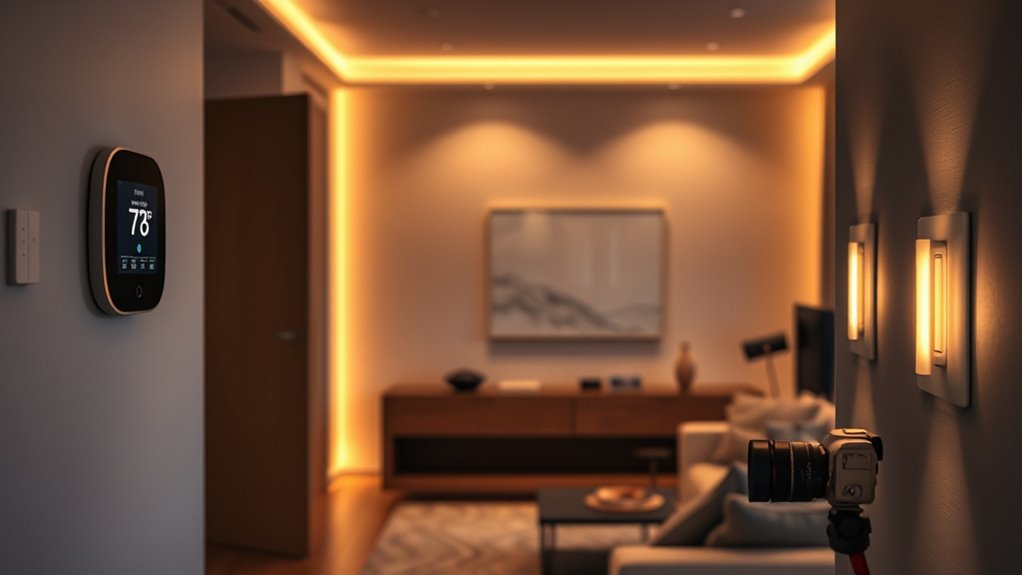
When choosing Thread-enabled smart home devices, I focus on how well they work with my existing ecosystem and their security standards. I also consider their power needs and how easy they are to install and connect with other devices. Finally, I look at whether they support future protocols to make sure my setup stays up-to-date.
Compatibility Across Ecosystems
Choosing Thread-enabled smart home devices requires careful attention to their compatibility across different ecosystems. These devices are designed to connect seamlessly within a mesh network, supporting interoperability across various platforms. Ensuring compatibility with major voice assistants like Apple HomeKit, Amazon Alexa, and Google Home allows integrated control no matter which ecosystem you prefer. Devices that support Matter over Thread further enhance cross-platform functionality, giving you the flexibility to control them from multiple ecosystems with a single device. Certification for Thread and Matter standards guarantees reliable communication and broader ecosystem compatibility. Keep in mind, a Thread Border Router or hub is often necessary to bridge Thread devices to your existing smart home setup, ensuring smooth integration and control.
Network Security Standards
Ensuring your Thread-enabled smart home devices are secure is just as important as verifying their compatibility. These devices use the Thread protocol, which relies on AES-128 encryption to protect data during transmission. A Thread Border Router manages security policies and handles device onboarding, making sure only authorized devices join the network. Secure commissioning and device authentication further prevent unauthorized access. Additionally, end-to-end encryption and local control capabilities reduce reliance on cloud services, lowering vulnerability risks. Compliance with industry standards like CSA, UL, and ISO guarantees that these devices meet strict safety and security criteria. By choosing devices that adhere to these security standards, you can confidently build a smart home that’s both innovative and protected against potential threats.
Power and Installation Needs
Selecting the right Thread-enabled smart home device involves paying close attention to its power and installation requirements to guarantee a seamless setup. First, make sure the device’s power needs match your home’s electrical system—typically 120V in North America or 230V in Europe. Check if it supports easy DIY installation or if professional wiring is necessary. Also, consider the device’s size and design to prevent blocking outlets or restricting access. Some devices can be powered via standard USB, while others require dedicated outlets with specific voltage and current ratings. Placement flexibility matters too; look for stackable designs or mounting options that fit your environment. Addressing these factors guarantees a smooth installation process and reliable operation in your smart home.
Device Interoperability Ease
Device interoperability is a key factor to contemplate when adding Thread-enabled smart home devices, as it directly impacts how smoothly your system functions. Because these devices use a standardized protocol, they communicate effortlessly across different brands and ecosystems, reducing setup headaches. Devices that support Matter further enhance compatibility, making pairing and managing multiple devices straightforward. The presence of a Thread border router or hub is crucial for reliable discovery and communication, especially between Thread devices and other smart systems. Additionally, local control over LAN allows devices to communicate directly without depending solely on cloud services, boosting responsiveness. When devices work seamlessly within a compatible ecosystem, automation becomes easier, and interactions more dependable, ensuring your smart home operates harmoniously.
Future Protocol Support
Considering future protocol support is vital because smart home standards are constantly evolving. I want my devices to stay compatible as new protocols and features emerge. Devices that support firmware updates and adhere to widely accepted standards like Matter are a smart choice, as they’re more likely to integrate seamlessly with future ecosystems. Choosing Thread devices with multi-protocol support—such as Wi-Fi, Zigbee, and Thread—adds versatility and helps future-proof my setup. This reduces the need for frequent replacements, saving money and hassle over the long run. A device designed with future-proofing in mind ensures ongoing compatibility, ongoing updates, and the ability to adapt to new protocols without becoming obsolete. It’s a critical factor for creating a sustainable, connected smart home.
Connectivity Stability Factors
Ensuring a stable Thread network requires paying attention to placement and environmental factors that can affect signal quality. Properly positioning border routers and repeaters is crucial, as their placement influences overall coverage and consistency. Mesh topology allows devices to route data dynamically, which improves resilience but depends on solid connections. A strong Wi-Fi or Ethernet connection for border devices is essential to prevent disruptions. Environmental obstacles like walls, metal objects, and interference from other wireless devices can weaken signals and cause instability. Minimizing these obstructions and choosing optimal locations for routers and repeaters helps maintain reliable communication. By considering these factors, you’ll ensure your Thread-enabled devices stay connected seamlessly, providing a smooth and responsive smart home experience.
Automation and Control Options
When selecting Thread-enabled smart home devices, it’s important to evaluate their automation and control options to guarantee seamless integration and responsiveness. These devices support low-latency, reliable communication over a mesh network, which means automation tasks happen quickly and smoothly. Many can operate independently of Wi-Fi or internet, so your smart home stays functional even during outages. Compatibility with ecosystems like Matter allows for unified control across multiple brands and devices. Additionally, features like secure encryption and over-the-air updates ensure your system remains safe and up-to-date. Managing these devices effectively requires support for various hubs or border routers, which help coordinate and automate your smart home setup. Overall, choosing devices with versatile control options helps create a more reliable, flexible smart home experience.
Device Size and Design
Choosing the right size and design for Thread-enabled smart home devices is essential because it directly impacts your home’s functionality and aesthetics. Compact devices prevent blocking adjacent outlets or obstructing other plugs, making them ideal for tight spaces. Sleek, minimalistic designs blend seamlessly with your decor, reducing visual clutter and enhancing your overall look. Stackable or space-saving configurations help maximize outlet usage, especially in limited areas. Durable materials and weatherproof ratings are vital if you plan to install devices outdoors or in exposed environments, ensuring longevity and reliability. Additionally, an ergonomic shape with accessible controls makes installation, setup, and daily use simple and hassle-free. Prioritizing size and design helps you create a smarter, more organized living space without sacrificing style or convenience.
Frequently Asked Questions
How Does Thread Improve Smart Home Device Connectivity and Reliability?
Thread enhances smart home device connectivity and reliability by creating a low-power, mesh network that connects all devices directly. This means I experience fewer drops and faster responses because each device communicates with others, not just a central hub. The mesh setup ensures better coverage and redundancy, so if one device fails, others keep the network running smoothly. Overall, it makes my smart home more stable, responsive, and easy to manage.
Are Thread-Enabled Devices Compatible With Existing Smart Home Ecosystems?
Yes, Thread-enabled devices are compatible with most existing smart home ecosystems, especially those supporting Zigbee or Apple’s HomeKit. I’ve found that many manufacturers are adding Thread support to their products, making integration smoother. However, it’s always a good idea to check specific device compatibility before buying. With a little setup, you can seamlessly incorporate Thread devices into your current system for more reliable and efficient smart home control.
What Security Features Are Standard in Thread-Enabled Smart Home Devices?
Thread-enabled smart home devices typically come with robust security features like end-to-end encryption, secure boot processes, and regular firmware updates to patch vulnerabilities. They often use unique device identities and support device authentication to prevent unauthorized access. I find these security measures reassuring because they help protect my home network from potential cyber threats, ensuring my smart devices remain safe and my personal data stays private.
Can Thread Devices Work Without an Internet Connection?
Did you know that over 80% of smart home devices rely heavily on internet connectivity? Luckily, many Thread-enabled devices can work without an internet connection by creating a local mesh network. This means your smart devices stay connected and functional even if your Wi-Fi goes down. I love this feature because it guarantees my smart home remains reliable and responsive, no matter what happens online.
How Does Thread Compare to Zigbee and Z-Wave for Home Automation?
Thread generally offers better reliability and faster response times than Zigbee and Z-Wave because it’s IP-based and uses IPv6. It also supports mesh networking, making it scalable and energy-efficient. While Zigbee and Z-Wave are widely compatible, Thread’s modern protocol provides more seamless integration with smart home ecosystems like Apple HomeKit. Overall, I find Thread to be more future-proof and robust for home automation.
Conclusion
I know upgrading to Thread-enabled smart devices feels like a big step, but trust me, the seamless connectivity and enhanced security are worth it. Don’t let fear of complexity hold you back—these devices are designed to simplify your life and make home automation effortless. Imagine coming home to a perfectly lit, cozy space, or knowing your appliances are safer and smarter. Embrace the future—your smarter, more connected home is just a device away.

